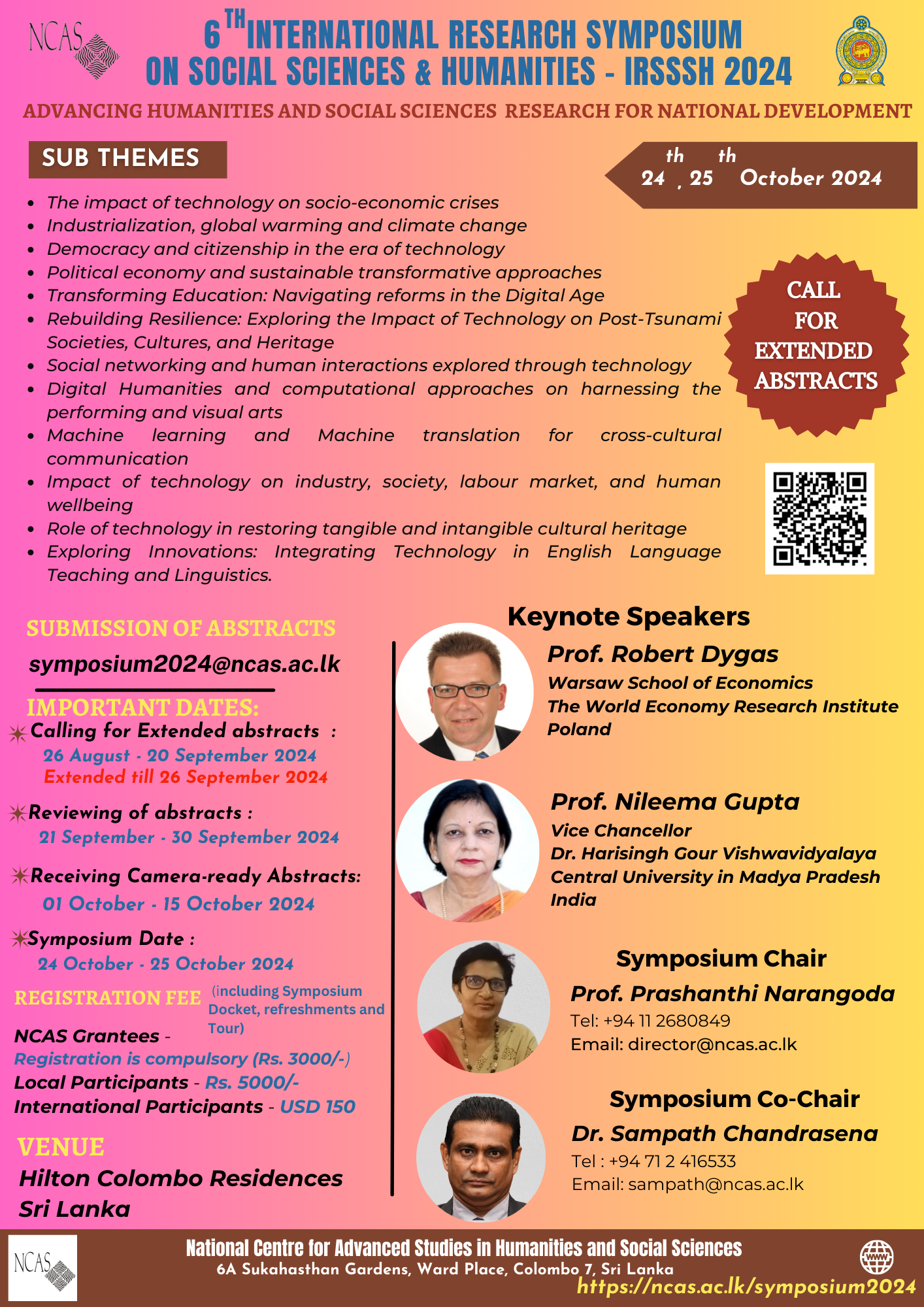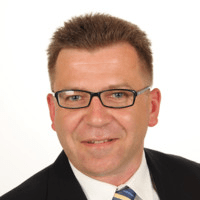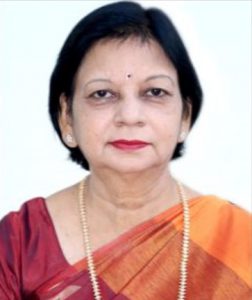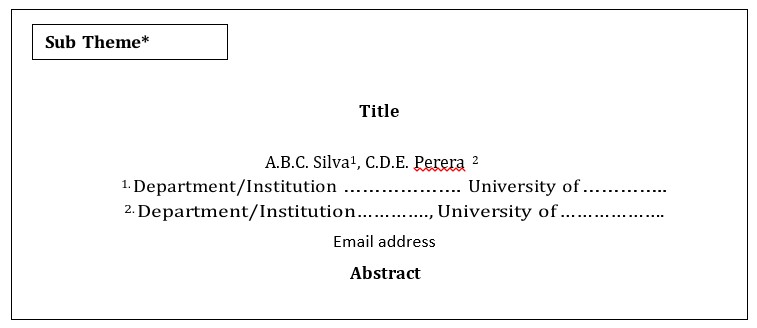
6th International Symposium on Social Sciences and Humanities (IRSSSH) 2024
Presentation Schedule IRSSSH2024
IRSSSH 2024 Payment Submission Link
IRSSSH 2024 Abstract and Declaration Submission Link
Download Declaration Form : IRSSSH 2024 Declaration Form
6th International Symposium on Social Sciences and Humanities
(IRSSSH) 2024
National Center for Advanced Studies in Humanities and Social Sciences
24th -25th October 2024
Advancing Humanities and Social Sciences Research for National Development
Humanities and Social Sciences comprise a broad spectrum of disciplines, ranging from the study of human behavior, which has given rise to diverse cultures, to an extensive exploration of history, literature, philosophy, psychology, sociology, economics, and political science. Together, these fields have played a pivotal role in shaping human societies, establishing laws, and maintaining order. Collectively, they offer invaluable insights into the human experience and societal structures, fostering a comprehensive understanding of the challenges and opportunities that span across past, present, and future contexts.
However, in an era characterized by rapid technological advancement and globalization, the significance of research in humanities and social sciences has often been overshadowed or neglected, with priorities leaning heavily towards technological devices and tools. The latest focus lies on Artificial Intelligence (AI) and its associated platforms. The consequential impact has been profound, leading to the devaluation of the role played by authentic behavioral patterns in shaping societies and their undeniable interconnectedness with modern society. This has widened the gap between technological advancements and human understanding, as societies invariably rely on customs, values, norms, economies, laws, and practices. Hence, there is an urgent imperative to advance research in humanities and social sciences for national development. Researchers and stakeholders in the field must closely examine the pivotal role these disciplines play in shaping the socio-economic, cultural, and political landscapes of nations globally. Therefore, the 6th International Research Symposium on Social Sciences and Humanities (IRSSSH) 2024 endeavors to explore various intersections of technology that could invigorate and expand studies in humanities and social sciences. It also aims to foster interdisciplinary dialogue and establish feasible modalities for national development.
Conference Objectives:
One of the primary objectives of the Symposium is to acknowledge that sustainable national development cannot solely rely on technological innovation and economic growth alone. While advancements in science and technology hold undeniable importance on a global scale, they must always be accompanied by a profound understanding of human behavior, socio-cultural diversity, unique economic and political structures, and historical contexts, all while respecting national and international relations. Research in humanities and social sciences offers a critical framework for addressing such complex societal issues and restoring equitable development models. By fostering interdisciplinary collaborations within these fields, significant contributions can be made to national development agendas while breaking down disciplinary barriers. It’s crucial to facilitate dialogue among researchers, which can then be effectively communicated to policymakers and practitioners, leveraging collective expertise to tackle multifaceted challenges like poverty, inequality, environmental degradation, and social unrest, while fostering solidarity and progress towards development goals.
Another crucial aspect to consider is the exploration of digital technologies and methodologies that are reshaping research practices in the humanities and social sciences. Big data platforms and computational modeling are rapidly unveiling vast amounts of research, influencing authentic research and data analysis, sometimes significantly impacting their applicability. However, the emergence of digital humanities and online ethnography presents immense opportunities for interdisciplinary collaboration worldwide, facilitated by interactive apps and databases. By spotlighting success stories and best practices in advancing research in humanities and social sciences, NCAS aims to inspire researchers to transcend the boundaries of knowledge and empower society for its development.
Conference Themes:
The themes of the Symposium are elaborated broadly and have emerged with a multi-disciplinary approach to facilitate greater opportunities for diverse studies:
-
The impact of technology on socio-economic crises
-
Industrialization, global warming and climate change
-
Democracy and citizenship in the era of technology
-
Political economy and sustainable transformative approaches
-
Transforming Education: Navigating reforms in the Digital Age
-
Rebuilding Resilience: Exploring the Impact of Technology on Post-Tsunami Societies, Cultures, and Heritage
-
Social networking and human interactions explored through technology
-
Digital Humanities and computational approaches on harnessing the performing and visual arts
-
Machine learning and Machine translation for cross-cultural communication
-
Impact of technology on industry, society, labour market, and human wellbeing
-
Role of technology in restoring tangible and intangible cultural heritage
-
Exploring Innovations: Integrating Technology in English Language Teaching and Linguistics.
Call for Extended Abstracts:
The National Center for Advanced Studies in Humanities and Social Sciences (NCAS) invites researchers, scholars, practitioners, and graduate students to submit abstracts and proposals addressing the conference themes outlined above. Submissions may encompass original research, case studies, theoretical perspectives, and practical applications in Humanities and Social Sciences. We particularly encourage submissions that reflect interdisciplinary collaborations and innovative approaches, but are not limited to them. Accepted papers will be presented at the conference and published in the proceedings.
Guidelines for Submission of Extended Abstracts
-
The abstract must present original research.
-
The given template should be used (see below).
-
The extended abstract should strictly cover the following:
-
Introduction to the Study
-
Literature Review
-
Methods and Methodology
-
Results and Discussion
-
Conclusions and Remarks
-
4 – 8 keywords (according to alphabetical order in italics)
-
Selected References (Maximum 10- using Harvard Referencing), and follow in-text referencing throughout the paper. (https://www.dkit.ie/library/library-supports/guide-to-harvard-referencing.html)
-
-
The abstract should be coherent and devoid of any language errors.
-
Font: Times New Roman, size 11 with 1.5 spacing on A4 size paper.
-
Number of words: 1000-1500 excluding Keywords and References.
-
Provide the name, email, telephone of the corresponding author in the email content.
-
The sub-theme (listed above) under which the abstract is submitted, should be indicated in the space provided.
Abstracts that do not follow the above guidelines will be rejected
Please use the following template for submission of the Extended Abstracts:
Email the abstracts to symposium2024@ncas.ac.lk on or before 20th September 2024.
For more details, visit https://ncas.ac.lk/symposium2024
Important Dates:
Call for abstracts |
26.08.2024- 20.09.2024Extended till 26 September 2024 |
Reviewing of Abstracts |
21.09.2024- 30.09.2024 |
Notification of Acceptance/ revisions |
01.10.2024- 15.10.2024 |
Acceptance of revised/ updated abstracts |
01.10.2024- 15.10.2024 |
Registration of Symposium Participants:
Early Bird Registration |
Rs. 3000/- |
Registration |
Rs. 5000/- |
Overseas Participants |
50USD |
Keynote Speakers- Dr. Robert Dygas
 Dr Robert Dygas is a Professor at SGH Warsaw School of Economics at the East Asian Economic Studies Department of The World Economy Research Institute. He completed his master’s studies at the Warsaw School of Economics, majoring in Finance and Banking, and at the University of Aarhus in Denmark, majoring in Management. He received his Ph.D. in Economics from the Warsaw School of Economics in 2003 (dissertation: “Strategic Management in the Mobile Telephony Industry in Poland in 1995-2001”). In 2011 he was awarded the Executive Master of Business Administration degree by the Warsaw University of Technology, Business School. He has 23 years of professional experience in multinational corporations in IT, telecommunications, and public sector. From 2015 to 2020 he worked also as the external expert for the evaluation of Horizon 2020-ECI-FTI proposals (Research Executive Agency EASME under the power delegated by the European Commission).
Dr Robert Dygas is a Professor at SGH Warsaw School of Economics at the East Asian Economic Studies Department of The World Economy Research Institute. He completed his master’s studies at the Warsaw School of Economics, majoring in Finance and Banking, and at the University of Aarhus in Denmark, majoring in Management. He received his Ph.D. in Economics from the Warsaw School of Economics in 2003 (dissertation: “Strategic Management in the Mobile Telephony Industry in Poland in 1995-2001”). In 2011 he was awarded the Executive Master of Business Administration degree by the Warsaw University of Technology, Business School. He has 23 years of professional experience in multinational corporations in IT, telecommunications, and public sector. From 2015 to 2020 he worked also as the external expert for the evaluation of Horizon 2020-ECI-FTI proposals (Research Executive Agency EASME under the power delegated by the European Commission).
Special Guest Speech- Professor Nileema Gupta
 Professor Nileema Gupta is the Vice Chancellor of Dr. Harisingh Gour Vishwavidyalaya Sagar, a Central University in Madya Pradesh, India. Since 2018, she has served as the Vice Chancellor of Tilka Manjhi Bhagalpur University, Bhagalpur and Chatrapati Sahuji Maharaj Kanpur University, Kanpur. She is Professor in the Department of Animal Science in the M. J. P. Rohilkhand University, Bareilly, India. Throughout her research career, she has published 137 articles with 357 citations of which 11 are being in H-indexed journals. She obtained her MPhil and PhD from Aligarh Muslim University, and DSc from M. J. P. Rohilkhand University. She has been a nationally and internationally recognized scholar for her capacity to enhance the blended learning and multi-disciplinary approach on reaching higher educational goals.
Professor Nileema Gupta is the Vice Chancellor of Dr. Harisingh Gour Vishwavidyalaya Sagar, a Central University in Madya Pradesh, India. Since 2018, she has served as the Vice Chancellor of Tilka Manjhi Bhagalpur University, Bhagalpur and Chatrapati Sahuji Maharaj Kanpur University, Kanpur. She is Professor in the Department of Animal Science in the M. J. P. Rohilkhand University, Bareilly, India. Throughout her research career, she has published 137 articles with 357 citations of which 11 are being in H-indexed journals. She obtained her MPhil and PhD from Aligarh Muslim University, and DSc from M. J. P. Rohilkhand University. She has been a nationally and internationally recognized scholar for her capacity to enhance the blended learning and multi-disciplinary approach on reaching higher educational goals.
